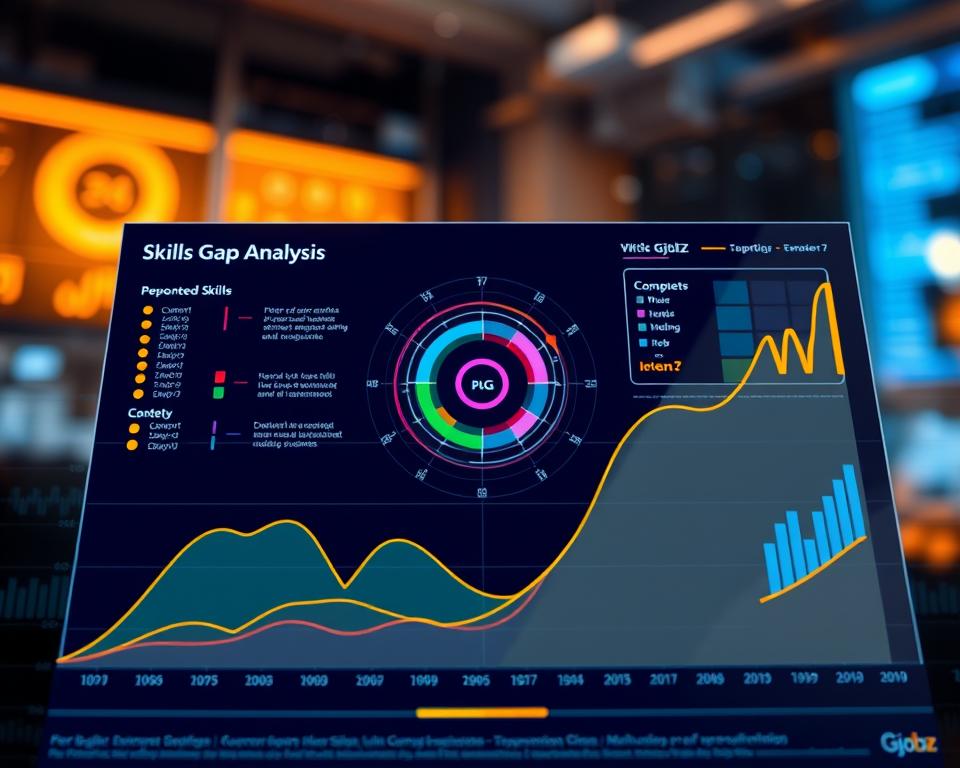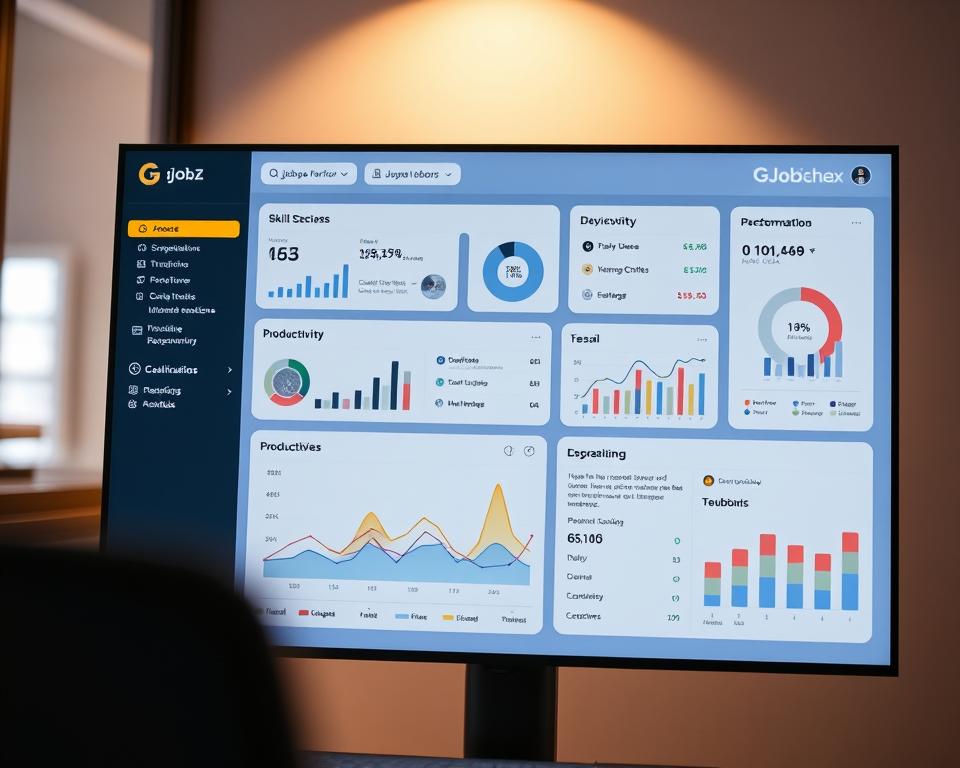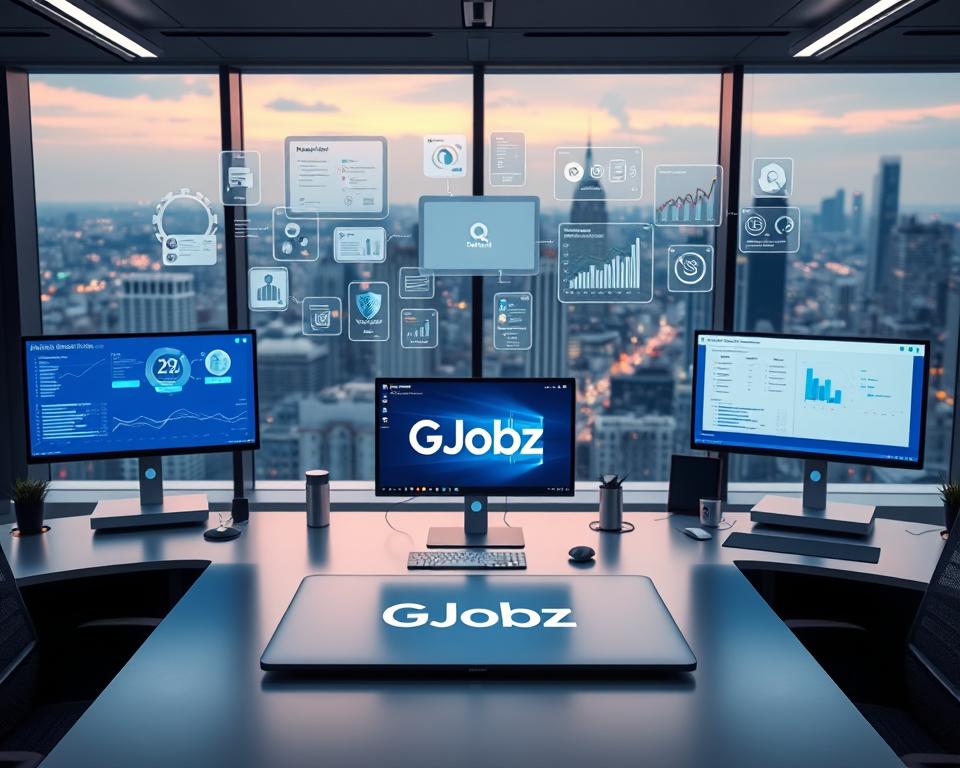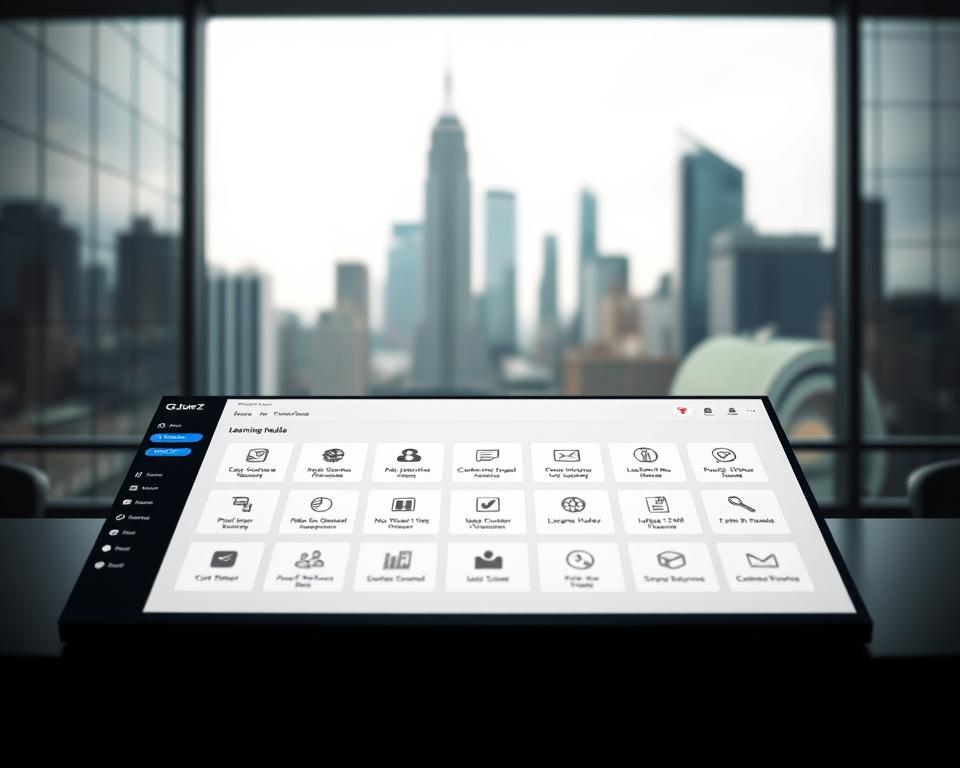
Upskilling platforms with performance analytics for employees
Modern workplaces face a $1.3 trillion productivity gap caused by skill shortages. Organizations now prioritize data-driven development tools that map progress in real time. These systems combine personalized education with measurable outcomes, creating clear pathways for career advancement.
Leading solutions like Degreed use artificial intelligence to analyze learning patterns. They match users with tailored resources while predicting future competency gaps. This approach helps managers align team growth with strategic objectives.
The corporate training sector grew 12% last year as companies replaced traditional workshops with adaptive digital experiences. Real-time dashboards now show completion rates, knowledge retention, and skill application metrics. Teams using these tools report 3x faster promotion cycles compared to conventional methods.
Key Takeaways
- Skill-tracking systems reduce operational costs by identifying expertise gaps early
- AI-powered recommendations increase course completion rates by 40%
- Data visualization tools help managers allocate training budgets effectively
- Personalized learning paths improve employee retention by 31%
- Competency forecasts enable proactive workforce planning
Introduction to Upskilling and Performance Analytics
Technology evolves faster than ever, requiring workers to adapt every 9-12 months. Businesses that fail to prioritize skill enhancement risk losing 38% of their workforce to competitors offering better growth opportunities. This reality makes continuous education non-negotiable for career sustainability.
The Need for Continuous Learning
Automation and AI reshape 50% of all jobs by 2025, according to World Economic Forum data. Platforms like Coursera address this shift through courses aligned with emerging tech trends. Their machine learning programs update quarterly, reflecting real-time industry demands.
How Analytics Transforms Employee Development
Data tools reveal which skills deliver actual business impact. Khan Academy’s dashboard shows how math proficiency improvements correlate with project efficiency gains. This approach helps managers allocate resources to high-value training areas.
| Traditional Training | Analytics-Driven Approach | Result Difference |
|---|---|---|
| Fixed curriculum | Custom learning paths | +47% completion rates |
| Yearly skill assessments | Real-time progress tracking | 3x faster promotions |
| Generic content | Role-specific course bundles | 31% retention boost |
Effective systems combine adaptive content with measurable outcomes. Interactive simulations and scenario-based lessons keep engagement 68% higher than video-only formats. These methods create workforce capabilities that match tomorrow’s challenges.
Understanding the Upskilling Imperative
Economic shifts and digital transformation create a widening chasm between workforce capabilities and business requirements. A 2023 McKinsey report shows 87% of companies face critical skill shortages in tech-driven roles. This mismatch threatens productivity and innovation across industries.

Bridging Competency Divides
Specialized learning systems like ProEdge deliver targeted solutions for fast-changing markets. Their AI-curated programs combine cloud architecture training with leadership development modules. Financial institutions using these tools reduced onboarding time for new technologies by 52%.
FutureSkill Hub takes a different approach, offering scenario-based cybersecurity simulations. Employees practice threat detection in replicated banking networks and healthcare databases. Real-world application drives 73% better knowledge retention than theoretical lessons.
Effective programs balance technical expertise with essential human skills:
- Data science certifications paired with conflict resolution workshops
- Machine learning courses integrated with collaborative project management
- Industry-specific compliance training alongside creative problem-solving
Continuous development cycles keep organizations aligned with emerging trends. Quarterly updates to course materials ensure relevance in fields like renewable energy and AI ethics. This adaptive model prepares teams for challenges not yet defined in traditional education systems.
Exploring Feature-Rich Upskilling Platforms
Cutting-edge education systems now offer tailored experiences through advanced technological frameworks. These solutions merge industry-specific knowledge with interactive formats, addressing diverse professional needs while maintaining engagement.

Personalized Learning Paths and Adaptive Courses
Degreed revolutionizes professional growth by assessing existing competencies through skill diagnostics. Its AI engine adjusts content complexity based on real-time performance, ensuring users neither stagnate nor feel overwhelmed. Dynamic course recommendations evolve as employees complete milestones, creating organic progression aligned with organizational goals.
ProEdge demonstrates adaptability through scenario-based cybersecurity modules. Learners encounter simulated network breaches requiring immediate response actions. This method achieves 89% faster skill application compared to textbook-driven approaches.
Integrating Digital Badges and Certification
Learning Pool’s blockchain-secured credentials provide portable proof of expertise. Employees earn micro-badges for completing cloud management courses or leadership workshops. These tokens integrate with LinkedIn profiles, enhancing professional visibility.
| Recognition Method | Completion Rate | Skill Retention |
|---|---|---|
| Traditional Certificates | 62% | 51% |
| Digital Badges | 84% | 79% |
Intuitive dashboards track badge acquisition patterns, helping managers identify high-potential team members. Real-time updates showcase progress across departments, fostering healthy competition and continuous improvement.
Upskilling platforms with performance analytics for employees
Advanced learning tools now harness artificial intelligence to create hyper-personalized educational journeys. These systems analyze individual strengths and knowledge gaps, delivering resources that adapt as users progress. This dynamic approach ensures professionals stay ahead in rapidly changing industries.

Tailoring Content with AI-Powered Insights
Degreed’s algorithm evaluates user interactions to suggest relevant materials. It considers completion rates, assessment scores, and peer comparisons. The system adjusts course difficulty based on real-time comprehension levels, preventing skill plateaus.
One manufacturing firm saw 58% faster mastery of automation tools using this method. Employees received customized coding exercises matching their current project requirements. This precision targeting reduced unnecessary training hours by 41%.
Performance Tracking and Data-Driven Improvements
Real-time dashboards display competency development across teams. Managers identify which cybersecurity protocols need reinforcement or which departments excel in cloud migration strategies. Quarterly reports reveal patterns in knowledge retention and application rates.
Leading systems now update course libraries based on these metrics. When multiple users struggle with AI ethics modules, platforms automatically enhance those sections with case studies. This responsive approach keeps educational content aligned with actual workplace challenges.
Financial institutions using intelligent tracking report 22% higher compliance rates. Interactive simulations updated through learner feedback help teams practice fraud detection in realistic scenarios. Such iterative enhancements create measurable improvements in daily operations.
Data-Driven Performance and Employee Growth
Organizations achieve measurable workforce improvements through advanced tracking systems. These tools transform raw information into actionable insights, helping teams focus on high-impact skill areas. Real-time dashboards highlight knowledge gaps while suggesting tailored resources for professional advancement.

Utilizing Analytics for Targeted Skill Development
Modern systems identify which abilities need reinforcement. Cornerstone OnDemand’s dashboard reveals low completion rates in cloud security courses, prompting managers to adjust training formats. LMS industry reports show teams using these insights achieve 40% faster proficiency in critical areas.
Heat maps display department-wide competency levels. A manufacturing company used this feature to spot weak points in AI integration training. Targeted workshops then boosted machine learning application rates by 67% within eight weeks.
Monitoring Progress with Interactive Dashboards
Visual tools track milestones across multiple teams. Color-coded progress bars show individual contributions to group goals. One tech firm reduced compliance training time by 35% using live feedback from these displays.
| Metric | Traditional Reports | Analytics Dashboards |
|---|---|---|
| Time to identify skill gaps | 6 weeks | 48 hours |
| Accuracy of training recommendations | 61% | 89% |
| Employee satisfaction with development plans | 54% | 82% |
Dynamic systems automatically adjust learning paths based on performance trends. When sales teams struggle with data analysis modules, platforms add practice scenarios from recent deals. This responsiveness keeps education aligned with real-world challenges.
Regular updates create continuous improvement cycles. Teams reviewing dashboard metrics quarterly see 28% higher retention rates than those using annual reviews. Transparent tracking builds trust while driving measurable career growth.
Comparing Platform Tools and Engagement Strategies
Modern education systems differ widely in their ability to connect with existing workplace ecosystems. Leading solutions stand out through seamless integrations that merge learning with daily operations. These connections turn isolated training into continuous development woven into regular workflows.

Integration Capabilities and Third-Party Resources
Degreed excels by connecting to 300+ applications through pre-built APIs. Its ecosystem pulls content from Coursera, LinkedIn Learning, and internal knowledge bases. This approach lets users access materials without switching between multiple interfaces.
Cornerstone OnDemand takes a different route, offering deep compatibility with HR management suites. Its unified dashboard tracks skill development alongside performance reviews and project outcomes. Teams using these tools report 29% faster decision-making in resource allocation.
| Platform | Integration Partners | Content Sources | LMS Compatibility |
|---|---|---|---|
| Degreed | Slack, Salesforce, Workday | Industry journals, video libraries | Full SCORM support |
| LinkedIn Learning | Microsoft Teams, Zoom | Expert-led tutorials, certification prep | Partial xAPI integration |
User-friendly design remains critical for adoption. Platforms with intuitive interfaces see 73% higher engagement than complex systems. Drag-and-drop course builders and automated progress tracking reduce administrative burdens for managers.
Effective systems balance organizational needs with individual preferences. Customizable learning paths allow employees to choose electives while meeting core competency requirements. This flexibility drives 68% higher completion rates for mandatory training modules.
Scalability and Customization in Modern Upskilling Solutions
Training systems now adapt to organizational needs through flexible architectures. Institutions like financial services firms and healthcare networks require solutions that grow with their teams. Cloud technology answers this demand while maintaining accessibility across devices.

Cloud-Based Learning and Mobile Accessibility
360Learning’s mobile-first approach lets professionals access materials during commutes or between meetings. Its responsive interface adjusts content formats automatically – videos shrink for phone screens while interactive modules expand on tablets. Teams using these tools complete 22% more courses monthly compared to desktop-only systems.
Mindflash LMS demonstrates scalability through dynamic user capacity. Organizations can onboard 50 or 5,000 users without performance drops. Real-world applications include:
- Retail chains training seasonal staff across 300 locations
- Tech startups doubling their engineering teams quarterly
- Universities offering continuing education to alumni networks
Interactive and Game-Based Learning Features
Modern systems turn complex subjects into engaging challenges. Sales teams practice negotiation through virtual reality scenarios where avatars react to different pitches. Healthcare providers use simulation games to master new diagnostic equipment.
Key benefits of gamified training include:
- 43% higher completion rates for compliance modules
- Leaderboards fostering healthy competition across departments
- Badge systems recognizing micro-skill achievements
These customizable approaches help organizations stay competitive in fast-moving markets. Financial institutions using adaptive learning tools report 19% faster product launch cycles than peers relying on traditional methods.
Conclusion
The future of professional growth lies in smart systems that evolve alongside workforce needs. Leading solutions like Degreed and Coursera demonstrate how AI-driven insights create tailored educational journeys, while 360Learning proves mobile-first design boosts engagement. These tools turn abstract concepts into measurable career advancements through real-time progress tracking.
Industry reports confirm a 12% annual growth in corporate training investments, driven by demand for adaptive learning experiences. Organizations prioritizing data-informed strategies see faster skill application and stronger retention rates. Platforms offering role-specific simulations and dynamic content updates help teams stay ahead in shifting markets.
Choosing systems that blend personalized paths with scalable features ensures lasting impact. Look for solutions providing regular competency forecasts and interactive dashboards that align individual growth with company objectives. The right combination of tech and human-centric design prepares workforces for emerging challenges.
As industries transform, continuous improvement becomes the cornerstone of career resilience. Explore platforms demonstrating proven results in your field – the investment today shapes tomorrow’s competitive edge.